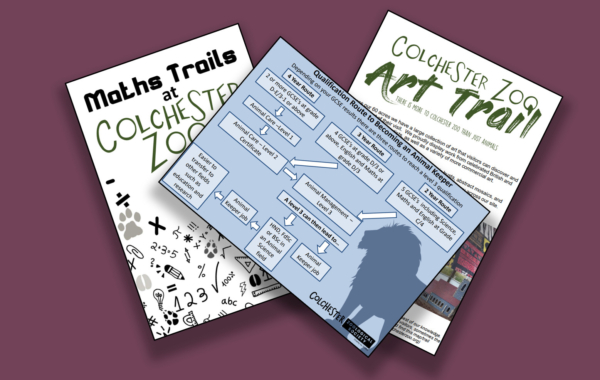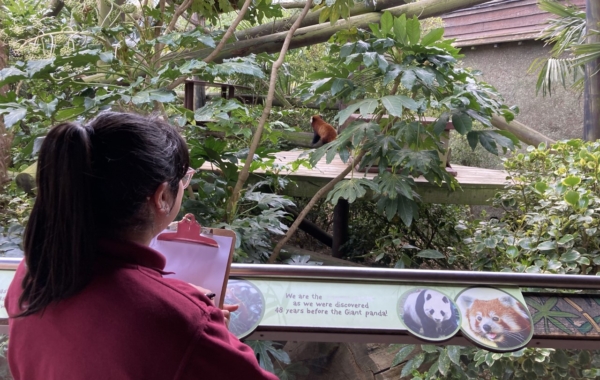Learn from zoo experts and see theories and concepts in action!
These modules are designed for students studying animal care at FE level. They provide detailed and specific information and allow access to areas of the zoo not normally available for the public to view.
Please note, we can not guarantee which animals will be seen on any specific tour.
Topics Available:
Click on a module topic or scroll down the page for more details of what will be covered:
Practicalities:
Animal Care Modules can be booked September through May on weekdays during Essex Term Time. If you are interested in these sessions outside these times please contact our Education Department (education@colchesterzoo.org) to discuss if this would be possible.
Sessions are for a maximum of 30 participants (students and teachers) , but we can run multiple sessions if you have a larger group.
Each module is 2 hours. One hour is spent in a classroom setting providing background information and an introduction to the topic. The other hour is out in the zoo participating in a tailored behind-the-scenes tour.
To Book, please contact the Education Department directly to discuss availability or make a booking: 01206 331292 ext. 463 or email education@colchesterzoo.org
Costs
Animal care modules cost £13.50 per post-16 student, which includes: zoo entry and the educational session including the tour.
Free teacher places are provided at a ratio of 1 per 10 students. Additional staff beyond this ratio are charged at £13.50 each. Carers are admitted free at a 1:1 ratio for any students with physical or emotional disabilities, are the subjects of SEND statements or EHCPs, or can provide other evidence of specific needs.
No minimum number of students is required, but there is a £100 minimum charge regardless of the number of students attending.
Risk Assessments
Please ensure all adult leaders and students are familiar with the Animal Care Module risk assessment guidelines.
Module Topics
Animal Behaviour
The session examines what behaviour is, with specifics to innate and learned behaviours. Potential ways behaviours are studied is then discussed in more detail. This is followed by looking at case studies to highlight and discuss stereotypical behaviour and what methods can be used to reduce them. Visitor effects on zoo animals are also examined through the use of case studies. On the tour, students will see ways the keepers can monitor behaviour as well as examples of how husbandry and enclosure design can allow animals to express a wider range of natural behaviours.
Click for subject areas covered:
- Innate and learned behaviour
- Animal intelligence
- Methods of monitoring and studying behaviour
- Abnormal and stereotypical behaviours
- Visitor effects
- Real world case studies
Animal Diet and Health
This session opens with a brief introduction to animal nutrition. The students then learn about different types of food presentation and how this relates to an animal’s diet and feeding regime. The tour involves seeing different types of food presentations and highlights how different species are fed in different methods. The tour may include a look at an animal kitchen.
Click for subject areas covered:
- Balanced nutrition
- Zoo diets vs. wild diets
- Feacal investigation
- Food presentation
- Practicalities of feeding
- Preventative health care
Animal Restraint
The differences between physical and chemical restraint are explored. This leads into the reasons for restraint and which methods are best in various circumstances. The talk ends with a discussion of how training can be used to avoid restraint. The tour involves examining equipment in enclosures used to restrain animals (e.g. crush cages), as well as equipment used to facilitate training (e.g. training walls).
Click for subject areas covered:
- Physical restraint
- Chemical restraint
- Crush cage
- Non-contact
- Training wall
- Injection training
- Crate training
Animal Training
Students will learn the theory and practical application of animal training and how it relates to animal behaviour. As a starting point, students learn the theory of classical and operant conditioning and the different types of operant conditioning. Building on that, students discover how training is a form of operant conditioning, and how clicker training can be used as positive reinforcement operant conditioning. The tour involves watching real training demonstrations such as injection training, displays training, and target training.
Click for subject areas covered:
- Operant conditioning
- Classical conditioning
- Positive reinforcement
- Steps of training
- Reasons for training
- Practicalities of training
Enclosure Design
Students will learn all about creating appropriate enclosures for zoo animals. Using examples from the zoo, pupils learn how enclosure design must meet the needs of the keepers, animals, and visitors. The needs of the animals are then explored in more depth with relation to the Five Freedoms and how we ensure proper animal care and welfare. The tour includes the chance to see enclosure features not normally visible to the public such as filter systems, incubation rooms, off-show housing, and dens.
Click for subject areas covered:
- Contact vs non-contact
- Designing for animals’ needs
- Designing for keepers’ needs
- Designing for visitors’ needs
- Enclosure functionality
- Innovative features
- Specific species requirement
Enrichment
Students learn how we keep our animals entertained. The problems of stereotypical behaviour (abnormal behaviour) and boredom in captive animals is examined. We’ll discuss the purpose of enrichment and the results of a variety of enrichment studies. On the tour, students will get the chance to see a variety of enrichment put in with different animals and note the results.
Click for subject areas covered:
- Enrichment
- Sensory, novelty, physical, social, problem solving enrichment
- Stereotypical behaviour
- Record keeping and monitoring
- S.P.I.D.E.R.
Ethics and Collection Planning
Students will discover how TAGS, regional and institution collection plans as well as EEPs are used by zoos in the 21st century to aid population management. The role of the ethics committee is also discussed and the students are given real ethical scenarios to discuss and resolve. The tour includes a variety of off-show areas with modifications/considerations needed for breeding groups such as cubing dens, separation stalls, breeding groups and bachelor groups, etc.
Click for subject areas covered:
- Role of ethics committee
- EEP
- TAGs
- Population management
- Curatorial decisions
- Ethical discussions and scenarios





